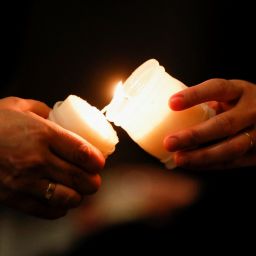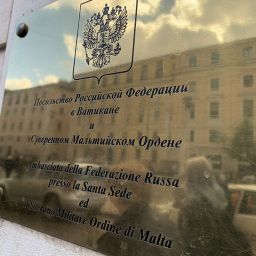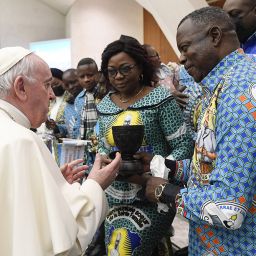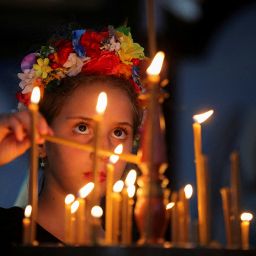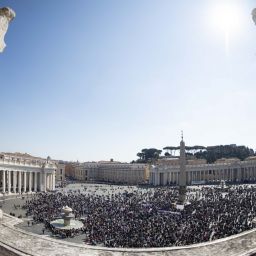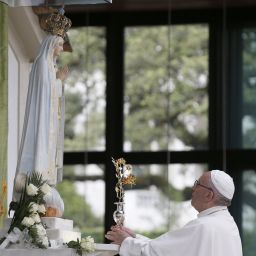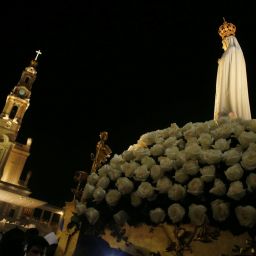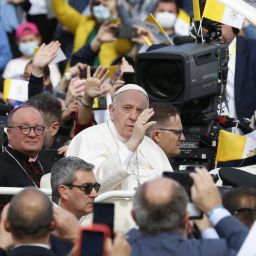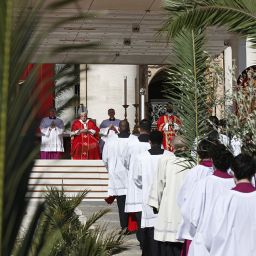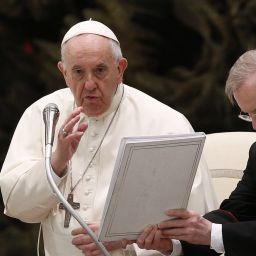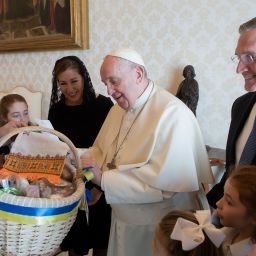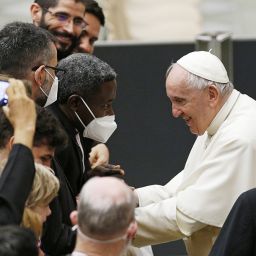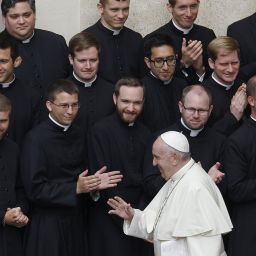By Carol Glatz
Catholic News Service
VATICAN CITY — Young people must take control of technology and “humanize” online spaces to be friendly, creative places — not isolated echo chambers, forms of addiction, or ways to escape, Pope Leo XIV said.
“Instead of being tourists on the web, be prophets in the digital world!” he told thousands of students gathered in the Paul VI Audience Hall Oct. 30.
“How wonderful it would be if one day your generation were remembered as the ‘generation plus,'” he told the mostly Gen-Z crowd to applause, “remembered for the extra drive you brought to the Church and the world.”
The pope’s meeting with students, including seminarians, was part of the Oct. 27-Nov. 1 Jubilee of the World of Education. The week of jubilee events included a papal Mass and audiences with educators as well as students and staff at Rome’s pontifical universities.
Pope Leo shook hands and chatted with the excited throngs of students lined up behind wooden barricades outside the audience hall and in the hall’s large atrium before the start of the meeting.
“I have been looking forward to this moment with great excitement,” he said in his address on stage, because it “reminds me of the years when I taught mathematics to lively young people like you.” The U.S. pope earned a degree in mathematics at Villanova University in Pennsylvania in 1977 and was a substitute and summer school teacher for math and physics at St. Rita High School in the Ashburn neighborhood of Chicago in the 1980s.
Education, he said, is “one of the most beautiful and powerful tools for changing the world.”
But it requires everyone, including students, to form alliances and work together, he said, highlighting the importance of the Global Compact on Education, launched by Pope Francis in 2019.
The compact represents “an alliance of all those who, in various ways, work in the field of education and culture, to engage younger generations in universal fraternity,” Pope Leo said.
Students “are not just recipients of education, but its protagonists,” he said.
“You are called to be truth-speakers and peacemakers, people who stand by their word and are builders of peace,” he told the students. “Involve your peers in the search for truth and the cultivation of peace, expressing these two passions with your lives, your words, and your daily actions.”
Among the new challenges that require a joint commitment in the global compact is digital education, the pope said.
“There are enormous opportunities for study and communication” in the digital world, he said, “but, do not let the algorithm write your story! Be the authors yourselves; use technology wisely, but do not let technology use you.”
When it comes to artificial intelligence, he added, “it is not enough to be ‘intelligent’ in virtual reality; we must also treat one another humanely, nurturing emotional, spiritual, social, and ecological intelligence.”
“Therefore, I say to you: Learn to humanize the digital, building it as a space of fraternity and creativity — not a cage where you lock yourselves in, not an addiction or an escape,” he said.
Pope Leo held up St. Carlo Acutis as a “timely example” of a young person “who did not become a slave to the internet, but rather used it skillfully for good” and as a tool for evangelization.
Another new challenge young people had proposed for the compact is getting help “in our education of the interior life,” the pope said, because “having a great deal of knowledge is not enough if we do not know who we are or what the meaning of life is.”
Young people may experience “that feeling of emptiness or restlessness that does not leave you in peace,” he said, or “episodes of distress, violence, bullying,” oppression, or isolation.
“I think that behind this suffering lies also a void created by a society that has forgotten how to form the spiritual dimension of the human person, focusing only on the technical, social, or moral aspects of life,” he said.
However, he said, “our desire for the infinite is a compass that tells us: ‘Do not settle — you are made for something greater’; ‘do not simply get along, but live.'”
A good role model, he said, is St. Pier Giorgio Frassati, who aimed for “the heights” by living with faith in God.
“Have the courage to live life to the fullest. Do not settle for appearances or fads; a life stifled by fleeting pleasures will never satisfy us,” Pope Leo told the young people. “Instead, let each of you say in your heart: ‘I dream of more, Lord; I long for something greater; inspire me!'”
“Keep striving ‘toward the heights,’ lighting the beacon of hope in the dark hours of history,” he said.
The third challenge the pope gave the young people is to be peacemakers.
“We must disarm hearts, renouncing all violence and vulgarity,” with “an education for peace that is disarmed and disarming,” he said.
“A disarming and disarmed education creates equality and growth for all, recognizing the equal dignity of every young person, without ever dividing young people between the privileged few who have access to expensive schools and the many who do not have access to education,” the pope said.
“I invite you to be peacemakers first and foremost where you live — in your families, at school, in sports, and among your friends — reaching out to those who come from other cultures,” he said.
Cutline for featured image: Pope Leo XIV greets students in the Paul VI Audience Hall at the Vatican Oct. 30, 2025, as part of the Jubilee of the World of Education. (CNS photo/Vatican Media)

